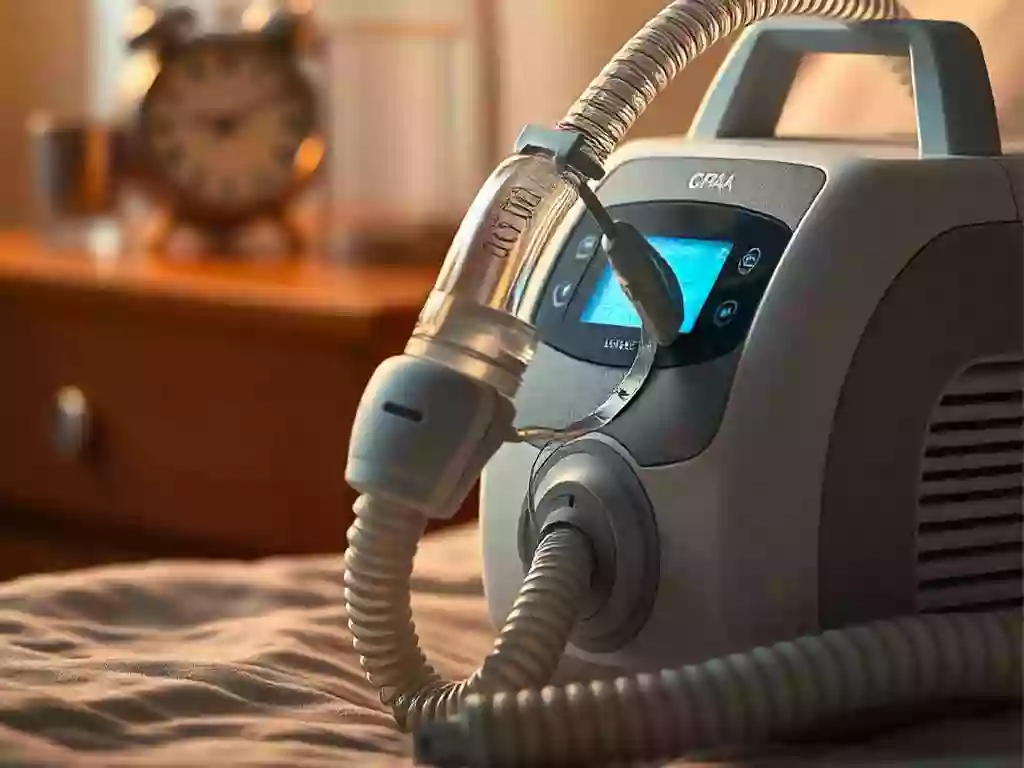If you or someone you know has been diagnosed with sleep apnea, you may have heard about CPAP machines. CPAP stands for “Continuous Positive Airway Pressure”, and it’s a device used to help people with sleep apnea breathe more easily while they sleep. Sleep apnea is a condition where a person’s breathing repeatedly stops and starts during sleep, which can lead to poor sleep quality and other health problems. In this article, we’ll explain what a CPAP machine is, how it works, its benefits, and how to use it.
What Is A CPAP Machine?
A CPAP machine is a device that delivers a steady stream of air through a mask to keep your airway open while you sleep. It helps prevent the airway from collapsing, which is what happens during sleep apnea. By providing continuous air pressure, it makes sure you can breathe properly all night long.
The Machine Has Three Main Parts:
The Motor
This is the main unit that pumps air into the mask.
The Hose
A flexible tube that connects the motor to the mask.
The Mask
Worn over your nose, or nose and mouth, the mask delivers air to your airway.
How Does A CPAP Machine Work?
When you sleep, especially if you have sleep apnea, the muscles in your throat relax, and this can cause your airway to narrow or close completely. This leads to pauses in breathing, which can wake you up many times throughout the night. These breathing interruptions may be so brief that you don’t remember them, but they can seriously affect your sleep quality and overall health.
The CPAP machine delivers a constant flow of pressurized air through the hose and mask. This air keeps your airway open, allowing you to breathe freely and continuously throughout the night. The pressure can be adjusted to suit your needs, and it helps prevent the soft tissues in your throat from collapsing.
Benefits Of Using A CPAP Machine
Using a CPAP machine can have several important benefits, especially for people who suffer from moderate to severe sleep apnea. Here are some of the main advantages:
Better Sleep Quality
The most obvious benefit of a CPAP machine is improved sleep quality. By preventing pauses in breathing, the machine helps you sleep more deeply and wake up feeling more refreshed. You’re less likely to wake up throughout the night, so your body gets the rest it needs.
Reduced Daytime Fatigue
People with sleep apnea often feel tired during the day because their sleep is constantly interrupted. CPAP therapy can help reduce daytime drowsiness by ensuring you get more uninterrupted sleep, so you’re more alert and energetic during the day.
Improved Heart Health
Untreated sleep apnea can increase the risk of high blood pressure, heart disease, and stroke because it puts stress on the cardiovascular system. CPAP therapy helps reduce the strain on your heart by ensuring you get enough oxygen throughout the night, which can lower your risk of these health problems.
Lower Risk Of Type 2 Diabetes
Studies have shown that sleep apnea is linked to a higher risk of developing type 2 diabetes. This is because poor sleep can affect how your body processes glucose (sugar). By improving your sleep, CPAP therapy may help lower your risk of developing diabetes.
Reduced Snoring
If you snore loudly, especially if your snoring is caused by sleep apnea, a CPAP machine can help reduce or eliminate the problem. Since the machine keeps your airway open, it prevents the vibrations in your throat that cause snoring.
How To Use A CPAP Machine
Using a CPAP machine can take some getting used to, but with the right setup and practice, it can become a normal part of your nightly routine. Here are the basic steps on how to use a CPAP machine:
Get Fitted For The Right Mask
There are different types of CPAP masks, and getting the right fit is important for comfort and effectiveness. There are:
Nasal Masks
which cover only the nose.
Full-face Masks
cover both the nose and mouth.
Nasal Pillow Masks
which rest just at the nostrils.
Work with your doctor or sleep specialist to find the mask that works best for you.
Set Up The Machine
Place the CPAP machine on a stable surface near your bed. Make sure the air filter is clean and the hose is properly connected to both the machine and the mask. Some machines also have a humidifier that can help keep your airways from getting too dry during the night.
Put On The Mask
Once the machine is ready, put on your mask before you go to bed. Adjust the straps to ensure a snug but comfortable fit. The mask should create a seal around your nose (or nose and mouth), but it shouldn’t be so tight that it’s uncomfortable.
Turn On The Machine
Once your mask is in place, turn on the CPAP machine. The machine will start delivering air at the prescribed pressure. You might feel a bit of resistance at first, but this is normal. Breathe normally and try to relax.
Adjust As Needed
It may take a few nights to get used to the sensation of wearing a mask and sleeping with the CPAP machine. If the air pressure feels too strong, many machines have a “ramp” feature that starts with a lower pressure and gradually increases to the prescribed level as you fall asleep.
Keep The Equipment Clean
It’s important to clean your CPAP machine regularly to prevent infections and ensure it works properly. Clean the mask, hose, and humidifier chamber (if your machine has one) at least once a week using mild soap and water. Let everything air dry completely before using it again.
Common Issues And How To Handle Them
Some people may find it difficult to adjust to using a CPAP machine at first. Here are a few common issues and tips to deal with them:
Feeling Claustrophobic
If you feel uncomfortable wearing the mask, start by wearing it for short periods while you’re awake. Once you get used to the sensation, it’ll be easier to use it during sleep.
Dry Mouth
If you wake up with a dry mouth, you may need to use a humidifier with your CPAP machine, or switch to a full-face mask if you tend to breathe through your mouth at night.
Air Leaks
If you feel air leaking from your mask, try adjusting the straps or make sure the mask size is correct.
Conclusion
A CPAP machine is a valuable tool for treating sleep apnea and improving overall health. It helps you breathe better during sleep, leading to better rest, reduced health risks, and improved quality of life. While it may take some time to get used to using a CPAP machine, the benefits are well worth the effort. If you’ve been diagnosed with sleep apnea, talk to your doctor about whether CPAP therapy is right for you.


